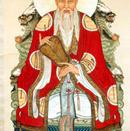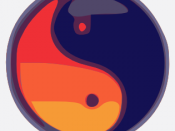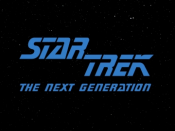Taoism: Action Versus Inaction
The Star Trek The Next Generation episode: 'Booby Trap' shows a perfect example of Taoist thought. The crew of the Enterprise is always taking some action in order to achieve a specific goal. This episode shows that through inaction you can sometimes achieve far more than you could through action. The mind of the physical senses cannot grasp the concepts of the unnameable. The crew of the Enterprise learn a valuable lesson on the nature of decision making and how to do without doing anything.
The Enterprise is caught in an ancient trap that uses the starships own power supply to destroy its occupants. The answer to the trap is to shut down the engines; by generating no power the trap is overcome. Taoism is a philosophy based on inaction: 'Therefore the Master acts without doing anything and teaches without saying anything.'(Tao Te Ching pg. 2)
When the true nature of the trap is revealed, Ryker states 'If we resist we die.
If we don't resist we die.' Neither action nor inaction was the key to salvation. Ryker's statement was based on a physical world; the Tao goes beyond action or inaction of a physical sense. The Tao Te Ching states, 'the Master does nothing, yet leaves nothing undone.'(pg. 38) The Master does not rely on the world of the senses to decide her action.
Everything the crew of the enterprise tried to do was based on overpowering the trap. 'More energy, faster adjustments. But that's exactly what we can't do because that's what we're supposed to do.'(Star Trek La Forge) All of the attempts to overcome the trap were based on action, trying to do something about the problem. The Tao teaches us to 'Stop thinking and end your problems.' The answer to all things...


